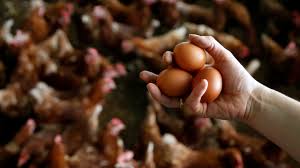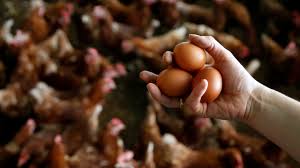
A call to stop "blaming and shaming" one another over a continental eggs contamination scare was given by Europe's food safety commissioner to countries.
After traces of a moderately toxic pesticide – called fipronil – were found in batches of eggs, tensions between agricultural ministers in the Netherlands, Belgium and Germany have risen.
Belgium's agriculture minister argued last Wednesday that it had been the Dutch who were dragging their feet in response to the potentially harmful pesticide while Belgian regulators were criticized for not acting fast enough after the fipronil contamination was first reported.
"Blaming and shaming will bring us nowhere and I want to stop this," EU Commissioner for Health and Food Safety, Vytenis Andriukaitis, said in a statement.
"We need to work together to draw lessons learnt and move forward instead of losing energy on finger pointing," he added.
In an attempt to resolve the ongoing dispute, before the end of September, Andriukaitis said he planned to organize a meeting of ministers and national watchdogs.
Meantime, Dutch prosecutors said two people were arrested in connection to Europe's latest food scandal.
According to the Netherlands' prosecution service, with two arrests made on individuals suspected of endangering public health, a joint Belgian-Dutch task force raided eight poultry farms in the Netherlands this week.
Linked to a Dutch supplier of cleaning products by authorities is fipronil, which is banned by the EU's food industry.
Since the scandal was reported by poultry farms in July, millions of eggs have been pulled from supermarket shelves across Europe. However, concerns that other products with the fipronil contamination, such as cakes and biscuits, had still not been withdrawn from sale were expressed by some national regulators.
It estimated around 700,000 affected eggs from Dutch farms had been distributed to Britain, the U.K.'s Food Standard's Agency (FSA) said.
The FSA confessed that many of the items which included the toxic pesticide will now have been consumed while some products that used Dutch eggs have since been withdrawn from supermarket shelves in Britain
Fipronil – a popular pesticide used to treat parasites commonly found in poultry, was found in the contaminated eggs, originating mainly from the Netherlands. The EU's food industry has banned fipronil.
Fipronil can have dangerous effects on the kidneys, liver and thyroid glands as it is "moderately toxic" to humans when it is consumed in large quantities, the World Health Organization said.
Fipronil can cause "nausea, vomiting, abdominal pain, dizziness and epileptic seizures", said NOVA, the Netherlands' food standards agency. However, the agency also stressed its effects were reversible.
(Source:www.cnbc.com)
After traces of a moderately toxic pesticide – called fipronil – were found in batches of eggs, tensions between agricultural ministers in the Netherlands, Belgium and Germany have risen.
Belgium's agriculture minister argued last Wednesday that it had been the Dutch who were dragging their feet in response to the potentially harmful pesticide while Belgian regulators were criticized for not acting fast enough after the fipronil contamination was first reported.
"Blaming and shaming will bring us nowhere and I want to stop this," EU Commissioner for Health and Food Safety, Vytenis Andriukaitis, said in a statement.
"We need to work together to draw lessons learnt and move forward instead of losing energy on finger pointing," he added.
In an attempt to resolve the ongoing dispute, before the end of September, Andriukaitis said he planned to organize a meeting of ministers and national watchdogs.
Meantime, Dutch prosecutors said two people were arrested in connection to Europe's latest food scandal.
According to the Netherlands' prosecution service, with two arrests made on individuals suspected of endangering public health, a joint Belgian-Dutch task force raided eight poultry farms in the Netherlands this week.
Linked to a Dutch supplier of cleaning products by authorities is fipronil, which is banned by the EU's food industry.
Since the scandal was reported by poultry farms in July, millions of eggs have been pulled from supermarket shelves across Europe. However, concerns that other products with the fipronil contamination, such as cakes and biscuits, had still not been withdrawn from sale were expressed by some national regulators.
It estimated around 700,000 affected eggs from Dutch farms had been distributed to Britain, the U.K.'s Food Standard's Agency (FSA) said.
The FSA confessed that many of the items which included the toxic pesticide will now have been consumed while some products that used Dutch eggs have since been withdrawn from supermarket shelves in Britain
Fipronil – a popular pesticide used to treat parasites commonly found in poultry, was found in the contaminated eggs, originating mainly from the Netherlands. The EU's food industry has banned fipronil.
Fipronil can have dangerous effects on the kidneys, liver and thyroid glands as it is "moderately toxic" to humans when it is consumed in large quantities, the World Health Organization said.
Fipronil can cause "nausea, vomiting, abdominal pain, dizziness and epileptic seizures", said NOVA, the Netherlands' food standards agency. However, the agency also stressed its effects were reversible.
(Source:www.cnbc.com)














